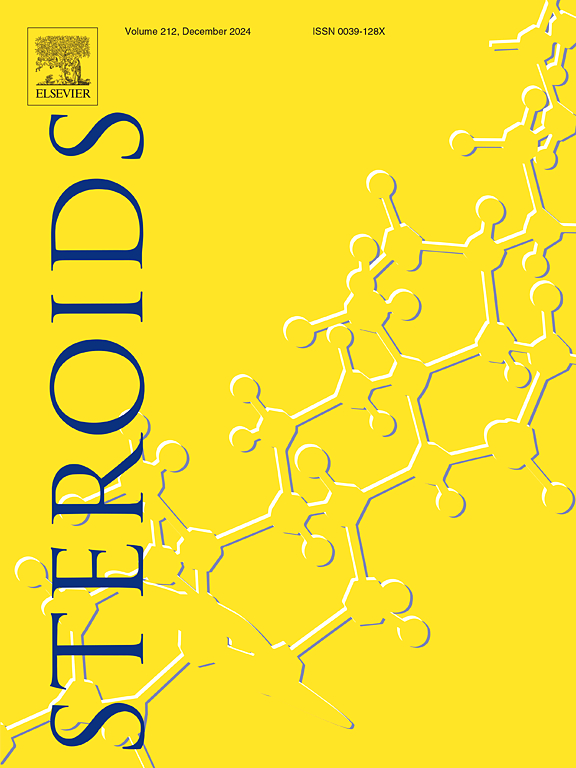从根源到恢复:草药在多囊卵巢综合征治疗中的作用
IF 2.1
4区 医学
Q4 BIOCHEMISTRY & MOLECULAR BIOLOGY
引用次数: 0
摘要
多囊卵巢综合征(PCOS)是一种常见的影响女性的复杂内分泌疾病,由遗传和环境因素共同引起。它通常出现在生育年龄(15-35岁),现在全世界每10名妇女中就有1名受到影响。多囊卵巢综合征的特点是雄激素水平高,尤其是睾丸激素水平高,同时出现许多卵巢囊肿(超过10个),导致无排卵、不孕和月经不规律。此外,多囊卵巢综合征与多种内分泌和代谢异常有关,包括肥胖、多毛症、痤疮、糖尿病、胰岛素抵抗和葡萄糖耐受性差。多囊卵巢综合征的治疗包括对抗疗法、阿育吠陀疗法和自然疗法,以及生活方式的改变。与对抗疗法相比,草药因其成本效益、疗效和在多囊卵巢综合征管理/治疗中的有利作用而得到认可。本文献综述简要探讨多囊卵巢综合征的诊断、症状、激素失衡、病因、相关危险因素和管理,特别强调草药在多囊卵巢综合征治疗中的作用。本文综述了几种对各种健康状况具有潜在治疗效益的药用植物。这些草药已被证明对治疗甲状腺功能减退、增生、肥胖、糖尿病、月经过多、睡眠障碍、心血管疾病、高脂血症、多毛症、不孕症和月经周期不规律等疾病有疗效。这些信息来自PubMed和多篇评论文章。各种草药,无论是单独使用,组合使用,还是作为提取物,都可以帮助减少与多囊卵巢综合征(PCOS)相关的风险因素。本文章由计算机程序翻译,如有差异,请以英文原文为准。
From root to Recovery: The role of herbs in polycystic ovary syndrome management
Polycystic ovarian syndrome (PCOS) is a prevalent complicated endocrine condition affecting women, caused by both hereditary and environmental factors. It often emerges during the reproductive years (15–35 years) and now affects 1 out of 10 women worldwide. PCOS is distinguished by high androgen levels, particularly testosterone, as well as the appearance of many ovarian cysts (more than 10), which result in anovulation, infertility, and irregular menstrual periods. Furthermore, PCOS is associated with a variety of endocrine and metabolic abnormalities, including obesity, hirsutism, acne, diabetes, insulin resistance, and poor glucose tolerance. PCOS treatment includes allopathic, Ayurvedic, and natural therapies, as well as lifestyle changes. In comparison to allopathic treatments, herbal medicines are recognized for their cost-effectiveness, efficacy, and favourable role in PCOS management/treatment. This literature review briefly examines PCOS diagnosis, symptoms, hormonal imbalance, causes, related risk factors, and management, with a particular emphasis on the role of herbal remedies in PCOS treatment. This review highlights several medicinal plants with potential therapeutic benefits for various health conditions. These herbs have demonstrated efficacy in managing ailments such as hypothyroidism, hyperplasia, obesity, diabetes, menorrhagia, sleep disturbances, cardiovascular disorders, hyperlipidemia, hirsutism, infertility, and irregular menstrual cycles. The information was sourced from PubMed and multiple review articles. Various herbs, whether used individually, in combination, or as extracts, may help reduce risk factors associated with polycystic ovary syndrome (PCOS).
求助全文
通过发布文献求助,成功后即可免费获取论文全文。
去求助
来源期刊

Steroids
医学-内分泌学与代谢
CiteScore
5.10
自引率
3.70%
发文量
120
审稿时长
73 days
期刊介绍:
STEROIDS is an international research journal devoted to studies on all chemical and biological aspects of steroidal moieties. The journal focuses on both experimental and theoretical studies on the biology, chemistry, biosynthesis, metabolism, molecular biology, physiology and pharmacology of steroids and other molecules that target or regulate steroid receptors. Manuscripts presenting clinical research related to steroids, steroid drug development, comparative endocrinology of steroid hormones, investigations on the mechanism of steroid action and steroid chemistry are all appropriate for submission for peer review. STEROIDS publishes both original research and timely reviews. For details concerning the preparation of manuscripts see Instructions to Authors, which is published in each issue of the journal.
 求助内容:
求助内容: 应助结果提醒方式:
应助结果提醒方式:


